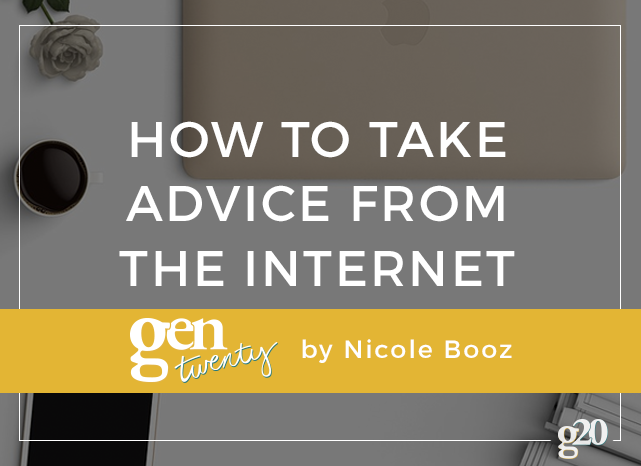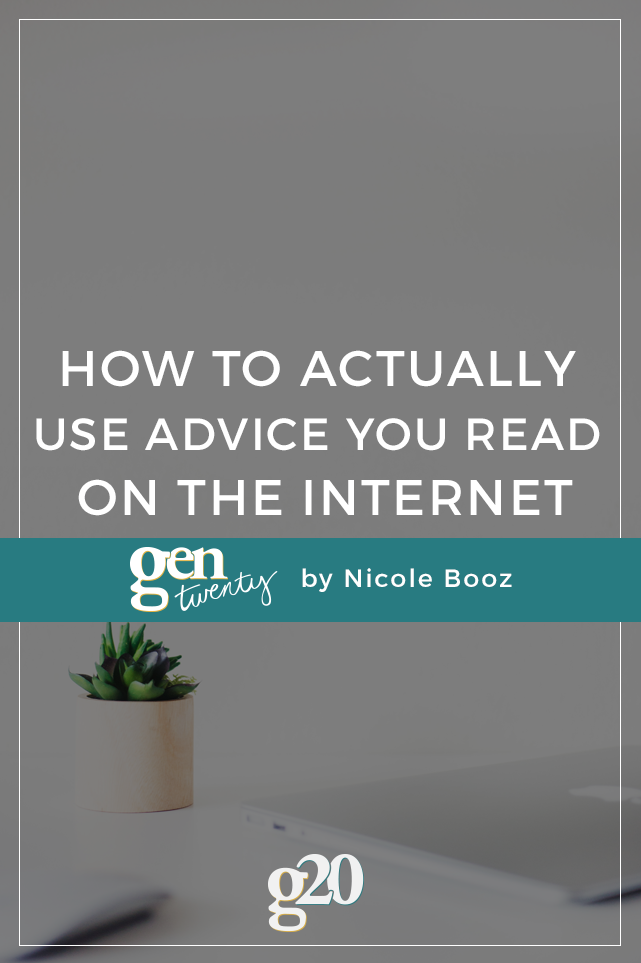
Most people write with the intention of helping other people in some way. There are tons and tons of blogs, websites, magazines–GenTwenty included–dedicated to helping you.
They share lessons and stories they’ve learned over time, and ultimately, the advice generally comes from a place of personal experience. For example:
“Do this because it worked for me.”
“Don’t do this because it ruined my life.”
“Try this because it got me out of a rut.”
“I’ll show you the shortcut so you don’t have to fail like I did!”
If you’re a self-improvement junkie (guilty), that means you already know to take most advice with a grain of salt. You’re not stupid. You know that just because something worked for one person in these very specific circumstances, doesn’t mean it will work for you–even if the situation was exactly the same.
So many people fail at taking good advice because they don’t know how to integrate that advice successfully into their own lives.
The Internet shares success stories like your grandma bakes cookies. You only get a taste of the finished and completely perfected result, not the years of failure and missteps that went into achieving these amazing outcomes.
This is, in fact, another advice article (yes, I am aware of the irony. Tweet me about it if it’s stressing you out). But, I think it’s necessary. I think there are amazing people out there sharing their stories and advice that they genuinely want to help you–(I know for a fact that we do here at GenTwenty). I think it’s critical that we share our stories, our knowledge, and our life lessons with each other to foster connection and learn from each other.
As the founder of GenTwenty, I have edited nearly 2000 posts. I’ve written hundreds of others, and read thousands of articles on the Internet–you probably have too. In that time, I’ve noticed several things: (1) People get discouraged when they aren’t able to replicate results, (2) Expertise has been displaced by urgency, and (3) There is some really bad advice out there online.
In light of all that jazz, I have a few tidbits that I’ve picked up on over the years when it comes to taking advice from the Internet. Remember, this advice is from my own personal experiences and can’t necessarily be taken as law, but I urge you to at least give me the benefit of the doubt before you take advice from the Internet.
1. Make your own mistakes.
This is huge selling point for a lot of marketers out there. It’s great and fantastic that person A has tried to shorten the learning curve for us, but keep in mind there is no greater teacher than your own mistakes.
People will drop hundreds of dollars under the guise of “I’ll teach you the shortcuts so you don’t have to go the long way ’round!” Consider–just for a moment–that maybe this person is successful because they paid no mind to shortcuts and instead learned for themselves.
Say for instance you’re reading a weight loss article. Yes, it would be amazing to lose the 10 pounds you’re always talking about. So you follow the article step-by-step. You realize the low calories diet is leaving you with brain fog, the scale is up, and you can’t stop thinking about that Hershey’s bar you’ve got stored in the bottom drawer of your desk. This plan clearly isn’t working for you, even if it worked for the lady on that really popular blog.
She does, however, write about the importance of portion control as she lost weight. Her calorie plan isn’t for you, but maybe there is something to this portion control idea. So you up your calories, start exercising, eat more vegetables and less candy, and slowly the weight starts to melt off. Voila. You’ve reached your goal before you know it. And in the process, you learned how your body reacts to different inputs and outputs. You didn’t start off on the right foot, but now you’re way more informed than when you started.
Keep in mind, knowing what doesn’t work is just as valuable as knowing what does work. In this case, knowing that eating less than X number of calories for your body weight and activity levels would be damaging to your metabolism and would actually halt your weight loss is valuable information to have. Advice articles can help you narrow this down, especially when you take the next step to heart.
The bottom line: Listen to what these the author has to say, but don’t discount your own learning curve. There are lessons to be learned from others’ mistakes, but ultimately the best way to learn is through your own version of trial and error.
2. Evaluate where you are.
Self-reflection is key. A million times over, it is the key to really making true and lasting change in your life. You cannot change your behavior, attitude or mindset if you don’t know where you are to begin with.
Whenever you read an advice article, consider, even just for a moment, where you are in relation to the advice right now.
Let’s consider a personal finance article. The author swears he paid off $50k in personal credit card debt in less than six months. That’s quite a feat, sure. He says he did it by drastically cutting back on expenses, taking on a roommate, booking out his weekends to freelance bartending and dog walking, negotiating a raise at his day job, and subsisting on rice and beans for six months. Cool.
You might have $50k in credit card debt, but you, like most people, are probably not in a position to make all of those sacrifices.(Heck, for all we know he could have done all that that just to write a blog post in hopes that it would go viral on Pinterest).
The takeaway here is that you can pay off your debt pretty quickly by making sacrifices. But what your personal sacrifices will be are just that–personal. No one can tell you what you can and can’t live without. This author is inspiring you to make huge changes in your life in order to eliminate debt.
The bottom line: Go for results, not replication by evaluating where you are right now. Figure out what you can sacrifice to make your goal a reality. Just because person A did it one way, doesn’t mean you have to. In the same vein, you can accomplish the same thing on your own terms in your own way by simply starting where you are, and not starting where you think you should be.
3. Ignore the time limit.
It’s pretty clickbait-y to title articles with time constraints. It certainly ups the “wow” factor when a person explains something they accomplished in a short amount of time.
Take for instance an article titled, “I Tripled My Pageviews in 2 Months! Here’s How I Did It.” Considering it took a person only two months to triple their pageviews, that’s pretty amazing. But consider this instead: “I Tripled My Pageviews! Here’s How I Did It.” That feat is still awesome, but has less urgency about it.
Let me ask you this: Is it any less amazing that someone tripled their pageviews in 4 months instead of 2? What if it took a year instead of 2 months? The fact of the matter is that most people (us mere mortals, if you will) don’t accomplish things in a small amount of time. And there’s nothing wrong with that.
In this case, adding the length of time it took to accomplish tripling pageviews is helping the author to establish expertise. It’s meant to make you think, “Surely this person knows what they are talking about it they were able to do this thing so quickly!” The truth that I would like to point out, though, is that the amount of time it took someone to accomplish something has nothing to do with expertise.
The bottom line: The next time you read an advice article, remove the time limit from the title and see how it reads differently. Time limits can be motivating under the right circumstances, but limiting in others. If it takes you 10 months to triple your pageviews (even following the authors exact advice), do not stress. It’s still worth celebrating, and still worth writing about — because you learned more about your audience and yourself in those 10 months than someone could ever teach you in a 1000 word blog post.
4. Don’t make it a comparison.
We talk a lot here about not comparing yourself to other people, and we mean every word of it. When people see advice articles, they tend to immediately compare themselves to the author or the circumstances. It’s human nature, really, but learning something more quickly or more slowly doesn’t make you any better or worse than someone else.
Make their article about you, not about them. Do some self-reflecting, remove the time limit, and be open to making your own mistakes. The Internet is so cool because you essentially get a peek inside someone’s brain without ever having to talk to them, if you don’t want to. It’s the perfect time to focus on your own personal development instead of having to also consider the other person’s needs. This sounds selfish, but you know what? It’s okay to be selfish.
It’s just crucial to realize that you can both succeed and you can both fail independently of each other. It’s not a zero sum game. We’re all winners and we’re all losers.
The bottom line: What they do is not about you, and what you do is not about them. Instead of comparing yourself to someone else, focus on the actions you’ll take to hit your goals.
Mad props to you if you made it this far. Hopefully you found something valuable here. I love getting advice from the Internet. There are so many wise people out there who genuinely offer great advice, but as you already know, it’s not as easy as just overlaying their words into your life.
Can make the most of the advice you find on the Internet by evaluating where you are, still making your own mistakes, ignoring time limits, and avoiding comparing yourself to the author.
Now, what’s the best advice you’ve ever gotten from the Internet?
[clickToTweet tweet=”How To Take Advice From The Internet” quote=”How To Take Advice From The Internet”]

